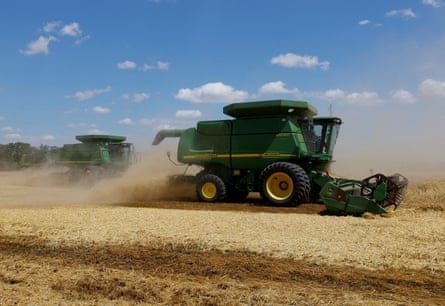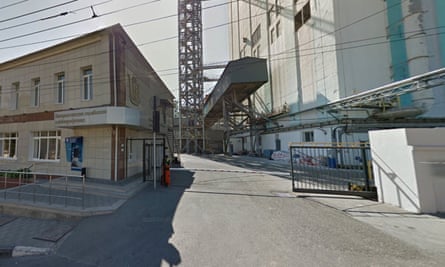‘Forged documents’: how Ukrainian grain may be enriching Putin’s circle

Russia’s farmers are achieving record grain harvests – according to official figures. But the numbers published by Vladimir Putin’s government appear to conceal the contribution to this bumper crop made by another set of farmers: those in occupied Ukraine.
Ukrainian officials and agriculture experts have claimed that favourable conditions are not enough to explain the giant harvest. They say instead that Ukrainian grain is being exported disguised as Russian produce.
The occupation authorities are “looting” Ukrainian grain, prosecutors alleged in one case against a suspected collaborator, “not for military operations or to meet the needs of the population but for selfish purposes and for motives of personal illegal profit”.
Farms are brought under occupation control through brutal means, according to prosecutors and a witness, while grain production allegedly flows away to Russian companies, including one with connections to Putin’s circle.
In May, the UK announced “a crackdown on the shady individuals and entities connected to the theft and resale of Ukrainian grain”, placing sanctions on those whom it said were shipping grain out of occupied territory “badged as Russian goods”.
But western powers have avoided imposing blanket restrictions on Russian food exports as they have done with other goods such as oil.
“It’s not enough,” said Vladyslav Vlasyuk, an adviser to the Ukrainian presidency and deputy head of Task Force UA, an inter-agency group tracing and confiscating assets of those under sanctions.
The Russians have a simple “business model” in occupied Ukraine, he said: “They just get all the grain they can,” send it mostly overland to Russia, “make forged documents [saying] that it’s not from occupied territory, that it came from Russia, then they export it.” The Middle East and Africa are major markets.
Mike Lee, a consultant on crop production in the former Soviet Union, calculated that more than a fifth of the 29m tonnes of grain expected from Ukraine’s most recent harvest is missing. As much as 5m tonnes may have been stolen by the Russians, he said, with the rest lost to war.

Secrecy
According to accounts from occupied territory, the Russians and their collaborators have used force to confiscate Ukrainians’ farms.
Andrian Khablenko ran a farm in the occupied southern region of Kherson that he said made annual profits of £80,000 before the war. He said he was taken from his home in September 2022 by occupation secret police known as the GSB to a detention centre.
Khablenko said torturers put a bag over his head and beat him for hours. They performed a mock execution, leaving him convinced he was about to die. Khablenko says that he was forced to sign a blank piece of paper that was to be filled in later authorising the transfer of his farm to members of the occupation regime.
The occupation’s grain operations are conducted in secrecy behind a shield of Russian troops, artillery and minefields, and the details of them – including where output from Khablenko’s old farm now ends up – are hard to trace. But legal filings, company records and analysis by YouControl, a Ukrainian data service, provide some indications.
A Ukrainian criminal filing in October said Khablenko’s extortion took place on the orders of the head of the occupation authorities in the Kherson region, Volodymyr Saldo.
A former Ukrainian MP and longstanding Russian sympathiser, Saldo set up a new company to trade Kherson’s grain output, prosecutors stated in criminal filings. They alleged that a Russian grain-trading company, Kuban-Forward, signed a deal to receive grain from this company and elsewhere in occupied Ukraine.
Before the invasion, only one customer for Kuban-Forward’s grain is listed in a Russian database of official tender and procurement records. The buyer is United Grain, one of Russia’s biggest agricultural conglomerates with annual revenue of more than $1bn.
Denys Dmytrovych Guev, Kuban-Forward’s registered sole owner, was one of the few contacts given on United Grain’s website, where he was listed since at least May 2022 as a representative for “grain trans-shipment services” at its vast Black Sea plant in Novorossiysk. In July, United Grain reported record exports from this plant.
Guev said: “We guarantee compliance with all sanctions laws and can confirm that all products are of Russian origin.”
He did not answer questions about Kuban-Forward’s current relationship with United Grain beyond saying that it was “not a representative” of the company. He said the description of him on United Grain’s website was “outdated”. Shortly after the Guardian contacted him, his name was removed from the site.
Train wagons bearing United Grain’s livery have been seen transporting grain from occupied Ukraine towards Russia, according to a report by international law specialists Global Rights Compliance. United Grain did not respond to a request for comment.

Oligarchs
United Grain’s majority owner is the Russian state. But in 2020 two individuals acquired a quarter of its shares via a holding company.
One, Taimuraz Bolloev, is reportedly a friend of the Russian president, once joining Putin’s old judo teachers and other intimates for a birthday cruise. According to Russian press reports, he worked on Putin’s victorious presidential campaigns in 2000 and 2004, and Putin’s rule has proved profitable for him.
When he branched out into clothing, Bolloev received exclusive contracts to dress the military. He also administered the torrent of public money that was spent with scant oversight on the Sochi Winter Olympics.
More recently he was one of the oligarchs granted control of businesses confiscated from western investors after the invasion of Ukraine.
Alexander Vinokurov, the other oligarch who acquired an interest in United Grain, is the son-in-law of Sergey Lavrov, Putin’s longstanding foreign minister.
A former president of the Russian society at the University of Cambridge, Vinokurov worked at Morgan Stanley and a US private equity fund before taking top jobs in the business empires of leading Russian oligarchs. “I am proud of my relationship with Mr Lavrov,” Vinokurov has said, “and am trying to model myself on him.”
Vinokurov has been placed under sanctions by western states, including the EU. His Marathon Group is reported to have profitably sold at least some of its shares in United Grain in August. Bolloev has been placed under sanctions by Ukraine alone. There have been no reports that he has disposed of his holding in United Grain.
Bolloev’s and Vinokurov’s companies did not respond to requests for comment.
Saldo, the governor of occupied Kherson, did not respond to questions either. He recently visited Moscow to give Putin an update on his new province. According to a Kremlin transcript, Putin congratulated him on a strong grain harvest.
Read also
Abbey Commodities – General Partner of BLACK SEA GRAIN.KYIV-2026
Black Sea & Danube Barley Market at a Turning Point: Demand Pressure and Regi...
US Supreme Court rules Trump’s emergency duties illegal
Mercosur: Protective measures for European agriculture
US makes concessions on pulses in new trade deal with India
Write to us
Our manager will contact you soon



